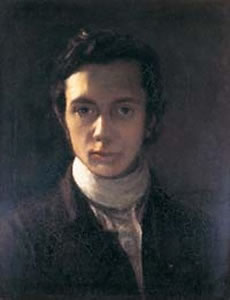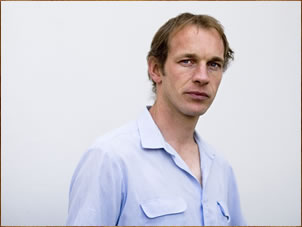De Nederlandse dichter Leo Vroman werd op 10 april 1915 in Gouda geboren. Leo Vroman viert vandaag zijn 95e verjaardag. Zie ook mijn blog van 10 april 2007 en ook mijn blog van 10 april 2008 en ook mijn blog van 10 april 2009.
Vrede
Komt een duif van honderd pond,
een olijfboom in zijn klauwen,
bij mijn oren met mijn mond
vol van koren zoete vrouwen,
vol van kirrende verhalen
hoe de oorlog is vedwenen
en herhaalt ze honderd malen:
alle malen zal ik wenen.
Sinds ik mij zo onverwacht
in een taxi heb gestort
dat ik in de nacht een gat
naliet dat steeds groter wordt,
sinds mijn zacht betraande schat,
droogte blozend van ellende
staan bleef, zo bleef stilstaan dat
keisteen ketste in haar lenden,
ben ik te dicht en droog van vel
om uit te zweten in gebeden,
kreukels knijpend evenwel,
en ‘vrede’ knarsend, ‘vrede, vrede’,
Liefde is een stinkend wonder
van onthoofde wulpsigheden
als ik voort moet leven zonder
vrede, godverdomme, vrede ;
want het scheurende geluid
waar ik van mijn lief mee scheidde
schrikt mij nu het bed nog uit
waar wij soms in dromen beiden
dat de oorlog van weleer
wederkeert op vilten voeten,
dat we, eigenlijk al niet meer
kunnend alles, toch weer moeten
liggen, rennen en daarnaast
gillen in elkanders oren,
zo wanhopig dat wij haast
dromen ons te kunnen horen.
Mag ik niet vloeken als het vuur
van een stad, sinds lang herbouwd,
voortrolt uit een kamermuur,
rondlaait en mij wakker houdt ?
Doch het versgebraden kind,
vuurwerk wordend, is het niet
wat ik vreselijk, vreselijk vind:
het is de eeuw dat niets geschiedt,
nadat eensklaps, midden door een huis,
een toren is komen te staan van vuil,
lang vergeten keldermodder,
snel onbruikbaar wordend huisraad,
bloedrode vlammen en vlammend
rood bloed, de lucht eromheen behangen
met levende delen van dode doch
aardige mensen, de eeuwlange stilte voor-
dat het verbaasde kind in deze zuil
gewurgd wordt en reeds de armpjes
opheft.
Kom vanavond met verhalen
hoe de oorlog is verdwenen,
en herhaal ze honderd malen:
alle malen zal ik wenen.
Biologie voor de jeugd
Hoofdhaar is een knolgewas.
Jij hebt knolletjes in je huid,
Taai en herfstachtig gras
komt daar geregeld uit.
En ieder knolletje is een knoest
van o wel duizend cellen.
Studeerde je histologie
dan moest je die allemaal tellen.
Ik echter zeg alleen maar dit:
dat onder haar en schedelbeen
een buidel hersencellen zit,
en dat daarvan één cel alleen
wel duizend gedachten wekt.
(Dit vriend zij u ten teken
dat een en ander wel eens lekt;
wij spreken dan van Spreken.)
Eén haartje uit je wonderhoofd
gerukt, ware zij uit je brein ontsproten,
zou je dus van een knol ter grootte
van een miljoen gedachten
hebben ontroofd;
en kon ik je zachte hersenen strelen
zoals ik nu je kruintje strijk,
dan stond wat je nu voelde gelijk
aan tien biljoen tafrelen.
Ontstelt u dus zulk vergezicht,
houd dan uw schedeldoosje dicht.
De kwal en het water
Een kwal die vond dat het water stonk
sprong aan wal, waar hij verdronk.
MORAAL
Wie al te grote afstand neemt
was van tevoren al wat vreemd.
OF
Voor al te fijn besnaarde kwallen
kan evolutie tegenvallen.

Leo Vroman (Gouda, 10 april 1915)
Vroman met zijn echtgenote Tineke
De Amerikaanse schrijver Paul Edward Theroux werd geboren op 10 april 1941 in Medford, Massachusetts. Zie ook mijn blog van 10 april 2007 en ook mijn blog van 10 april 2008 en ook mijn blog van 10 april 2009.
Uit: A Dead Hand
“The envelope had no stamp and only my name underlined on the front; it had somehow found me in Calcutta. But this was India, where big pink foreigners were so obvious we didn’t need addresses. Indians saw us even if we didn’t see them. People talked grandly of the huge cities and the complexity, but India in its sprawl seemed to me less a country than a bloated village, a village of a billion, with village pieties and village pleasures and village peculiarities and village crimes.
A letter from a stranger can be an irritation or a drama. This one was on classy Indian handmade stationery, flecks of oatmeal in its weave and reddish threads like blood spatter, with assertive handwriting in purple ink. So I dramatized it, weighed it in my hand and knifed it open slowly, as though I were being watched. In populous Calcutta, city of deformities, my being watched was highly likely. But how did anyone know I was at the Hotel Hastings, east of Chowringhee, in an obscure lane off Sudder Street, in every sense buried alive?
I happened to be looking for a story, but Calcutta had started to creep on my skin, and I had even begun to describe how the feel of this city in its exhalations of decay in the months before the monsoon was like the itch you experience when you empty an overfull vacuum cleaner’s dirt bag, packed with hot grit and dead hair and dust bunnies and dander, and you gag and scratch at the irritation and try to claw the tickle and stink off your face – one of my arresting openings.
As I was rereading the letter to see if it was authentic, a wasp began to swing in short arcs and butt the windowpane, seeing only daylight. I opened the window to release it, but instead of flying out it drowsed to another window and butted it – stupid! – then settled on my damp arm. I flicked at it. It made an orbit around my head and finally, though I’d tried to save it, did not fly out of the window but seemed to vanish somewhere in my room, where it would buzz and sting me in the night.
I remembered how my friend Howard at the American consulate had asked me the day before if I’d ever been married. I said, ‘No, and I’m at that stage in my life when I no longer see a woman and say to myself, “Maybe she’s the one for me.”‘
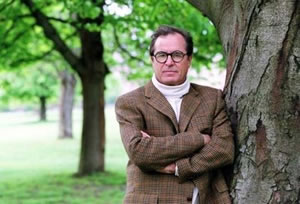
Paul Theroux (Medford, 10 april 1941)
De Italiaanse schrijver en vertaler Claudio Magris werd geboren op 10 april 1939 in Triëst. Zie ook mijn blog van 10 april 2009.
Uit: Utopie und Entzauberung (Vertaald door Karin Krieger, Ragni Maria Gschwend)
„Ein Papierkügelchen oderÜber das Vorurteil
Es muß im April oder Mai 1956 in Triest gewesen sein. Wir waren etwa in der fünften Gymnasialklasse, und in der Griechischstunde hatte einer meiner Kameraden namens Cecovini ein Papierkügelchen abgeschossen, das unvermutet auf dem kahlen Schädel des am Pult über das Klassenbuch gebeugten Lehrers gelandet war. Der blickte auf, sah vor sich in der ersten Reihe den Schüler De Cola sitzen und machte ihn sofort und ohne zu zögern als den Schützen aus. “Du,
mein lieber De Cola, der du dich damit amüsierst, Papierkügelchen zu schießen…” Der Beschuldigte beteuerte heftig seine Unschuld, doch vergebens, denn der Lehrer fuhr, gutmütig zwar, aber unbeirrt,
fort, auf ihn einzureden: “Tja, mein lieber De Cola, du hast nun mal die Angewohnheit, Papierkügelchen zu schießen, ich weiß… dir macht es Spaß, den Pandaros zu spielen, den trojanischen Bogenschützen, wie?”
Nach ein paar Minuten erhob sich der wahre Schuldige, Ehrenmann, der er war, und sagte: “Herr Professor, das war ich.” Worauf der Lehrer einen zerstreuten Blick auf ihn warf und erwiderte: “Ach, du warst das, na gut… aber auch du, De Cola, mit deiner Neigung, Papierkügelchen zu schießen…” Von diesem Tag an wandte sich unser Griechischlehrer, ein großer Kenner und Vermittler seines Fachs, jedesmal, wenn er das Klassenzimmer be-trat, sofort an De Cola: “Du, der immer Papierkügelchen
schießt… ich weiß, ich weiß, neulich ist es Cecovini gewesen, aber auch du, mit dieser schlechten Angewohnheit…”
Diese Unterrichtsstunde, die den Mechanismus eines Vorurteils aufdeckte und zeigte, wie tief es sich in uns einnistet, ohne sich von den Dementis der Realität beirren zu lassen, habe ich nie mehr vergessen. Die Tatsache, daß De Cola dieses eine Mal keine Papierkügelchen geschossen hatte, war für den Lehrer etwas ebenso Zufälliges und Unwesentliches wie die, daß es dieses eine Mal Cecovini gewesen war.“
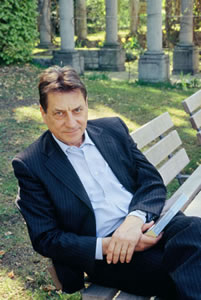
Claudio Magris (Triëst, 10 april 1939)
De Russische dichteres Bella Akhmadulina werd geboren op 10 April 1937 in Moskou. Zie ook mijn blog van 10 april 2009.
Features of an Artist’s Studio
for Boris Messerer
O future guest, guest most gentle!
Beneath this dear sublunar roof,
which only the unending bottom
of the All-mighty haze surmounts,
where from their pulpit four Victrolas
train their lordly eyes on you,
rejoice and sing to times a-passing,
to all Victrolas and me, too!
Better not think about
the unimaginable distance
I’m these days! Who’s spare a penny
for a candle for my soul
since I can’t entertain your party
with a sepulchral joke of two
and, unlike Virgil the Omniscient,
am not at the door to welcome you?
Come into the fantastic house
where daily life is universal,
where things and people are familiar
with a sudden shudder of forever
and the splash of little silver hearts
mysteriously sends signals through
about the drafts from outer space
to guests who used to sit here, too.
At the feet that mounted Calvary,
trust in the words I say to you
and guide yourself upstairs slowly
past the sixth floor, singing praises
to every doodad and gilhickey,
revere the fantasticality
of things, and don’t let the barrel organ’s
childlike spirit be scared of you.
Perhaps the sunset’s in the window,
or the music box in shedding tears,
or for the Mournful Specter of the North
yellow stands on end among the gray-
long may the house, like a lost balloon,
flutter over Boredom Valley
so you, O artless guest of mine,
may reach this strange land in the sky.
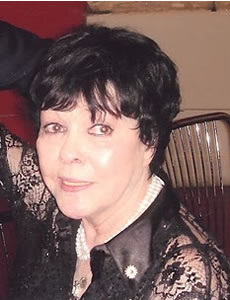
Bella Akhmadulina (Moskou, 10 april 1937)
De Duitse schrijver Stefan Heym (eig. Hellmuth Flieg) werd geboren op 10 april 1913 in Chemnitz. . Zie ook mijn blog van 10 april 2007 en ook mijn blog van 10 april 2008 en ook mijn blog van 10 april 2009.
Uit: Schreiben nach Auschwitz
„Nichts ist mehr, nach Auschwitz, so wie es vorher war. Der Rauch aus den Öfen hat das Blau des Himmels für immer getrübt; der Gestank des Orts wird über uns hängen bis ins dritte und vierte Geschlecht.
Nicht daß ich Anklage erhöbe gegen die, denen der Dr. Kohl die von ihm entdeckte Gnade der späten Geburt zugute kommen läßt. Es ist nicht meine Aufgabe, heute und hier Anklage zu erheben; und wer bin ich, mit Steinen um mich zu werfen, die wohl die Richtigen treffen würden, man kann sie gar nicht verfehlen – aber doch auch Falsche.
Die Anklage möge jeder gegen sich selbst erheben. Jeder möge sich prüfen: Wo stehe ich, mit Namen Soundso, und geboren nach Auschwitz, an diesem Herbsttag des Jahres 1988, und wo hätte ich damals gestanden, als die Opfer zusammengetrieben und auf die Reise geschickt wurden zu den Rampen des Dr. Mengele? Hätte ich mich erhoben in Protest? Hätte ich auch nur versucht, eine Rinde Brotes durch die Vergitterung der Güterwaggons zu schieben beim Halt der traurigen Züge auf irgendeinem der Bahnhöfe, durch die sie kamen? Oder mich abgewandt, mit geducktem Kopf, nur nichts sehen und hören – oder hätte ich mitgehöhnt gar und mitgeschrien?
Denn Auschwitz wird auch noch sein, ein Menschheitsalpdruck, nachdem der letzte verscharrt ist, der sich mitschuldig gemacht hat durch sein Reden und Tun, und durch sein Schweigen – durch Schweigen die Mehrzahl.“
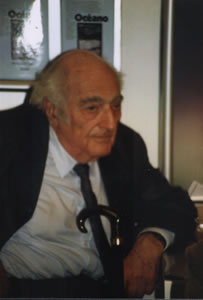
Stefan Heym (10 april 1913 – 16 december 2001)
De Duitse schrijver Richard Wagner werd geboren op 10 april 1952 in Lowrin, in Roemenië. Zie ook mijn blog van 10 april 2007 en ook mijn blog van 10 april 2008 en ook mijn blog van 10 april 2009.
Uit: Habseligkeiten
„Die Landschaft ist wie im Banat, die Häuser auch, nur die Straßen sind besser, sie waren schon im Kommunismus besser. So ist das mit den Ungarn. Egal, was ihnen zustößt, sie richten es immer so ei
n, daß es etwas besser aussieht, als bei ihren Nachbarn. Das macht die Nachbarn rasend, die Rumänen, die Serben, die Slowaken. Egal. Wie sie es auch drehen und wenden, die Ungarn sind stets besser dran.“
(…)
„Und sie nannten Beispiele aus dem Dorf , Beispiele von Frauen, die bei Kriegsende einen Rumänen geheiratet hatten, um nicht nach Rußland verschleppt zu werden. Diese hatten sich ein schweres Schicksal eingehandelt. Wenn man meine Großmutter so reden hörte, konnte man denken, die Frauen wären besser zur Zwangsarbeit nach Russland gegangen.“
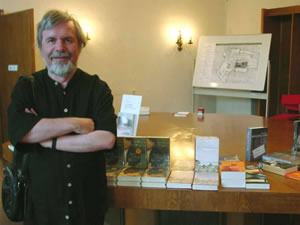
Richard Wagner (Lowrin, 10 april 1952)
Zie voor nog meer schrijvers van de 10e april ook mijn vorige blog van vandaag.


